
On 12 March 2020, the first case of COVID-19 was recorded in Kenya. To curb the spread of the virus, the Government put in place emergency containment measures including a nationwide dusk to dawn curfew; closure of schools, restaurants and businesses; restrictions on gatherings (including in places of worship); social distancing in public and in transport; mandatory use of face masks and hand washing in public places.
As a result of these restrictions and shutdown of businesses and commercial activity, socio-economic impacts have been severe – particularly on the informal sector, which employs the majority of Kenyans. In response, the Government unveiled an economic assistance package to cushion Kenyans against nancial hardships arising from the COVID-19 crisis, including a fund to assist vulnerable groups. Yet, the impact of the COVID-19 crisis in marginalised communities outside urban areas was not clear. Initial feedback from indigenous organisations and networks indicated that little information on COVID-19 prevention and response had reached indigenous communities, and misinformation was circulating on the spread and impact of COVID-19.
Historically, indigenous communities have been marginalised and experience deep inequalities in access to health care, water and sanitation, education and other basic services. Thus it was unclear how already marginalised communities would be able to comply with Government directives, or take prevention and self-protection measures. There were also indications of increasing gender-based violence in indigenous communities.
For this reason, United Nations Human Rights launched a scoping initiative to document the impact of the COVID-19 crisis on indigenous communities and indigenous women who face multiple forms of discrimination, as groups that are often left behind or marginalised. This initiative is part of engagement to integrate human rights dimensions in the COVID-19 response in Kenya, focusing on inequalities and leaving no one behind. The initiative also built upon existing engagement on indigenous rights, and on sexual and gender-based violence.
REPRESSIVE DISCIPLINARY AND CRIMINAL PROCESSES AGAINST VOCAL STUDENTS AT KENYA’S PUBLIC UNIVERSITIES
Academic institutions are the hub for nurturing and sustaining the right to education. Whilst it is to be expected that universities will always stand for the right to education, including free thought and scientific research, that aspirational role of universities is not being realized considering the worrying pattern of students’ expulsions and suspensions by Kenya’s public universities, mostly on non-academic grounds. The systemic trends eschew the democratic vision of education and rely on the precarious despotic administration model which increases vulnerability of the academic community to recurrent human rights abuse and violations.
Universities Act of 2012 is the legal-policy framework that guide operations of universities in Kenya. According to sections 19 and 20 of the Act, a University Charter is the instrument that establishes and gives legal status and authority to a University to inter alia undertake its academic programmes. The Commission for University Education in Kenya grants the charter to qualified institutions to offer university education and monitors the institutions to ensure compliance with provisions of the Act. The governance of a university is set out in section 35 of the Universities Act and includes a Council, Senate and Management Board. The Vice Chancellor of a University is an ex officio member of a University Council, and is the academic and administrative head of the institution. He/she also has the overall responsibility for the direction, organization, administration and programmes of the University.
Before 2012, the Vice Chancellors of public Universities were solely appointed by the president of the country. This left their tenure of office at the pleasure and mercy of the president. As a result, Vice Chancellors were seen to play partisan roles, predictably siding with the government, often at the expense of the students’ welfare. Although the law changed, and a Vice Chancellor is today appointed by the University Council, questions have remained concerning the independence of the office and the decision making of the university administration particularly around issues touching on management of student affairs and collective political culture.
Kenya’s university students have a rich history of organizing and political mobilization. And as such, especially during the Moi era, 1978-1990s, university students were seen as the unofficial political opposition in the country. As a result, in the 1980s, the government started the wave of arrest of students and their leaders. In fact, several student leaders from the University of Nairobi were arrested and subsequently jailed for their suspected role in the abortive coup in 1982. One of the students detained at the time was the then Chairman of the Students Union of University of Nairobi (SONU), Titus Adungosi who later died in prison. Later, left leaning politician and former legislator, Mwandawiro Mgagha was among the students arrested in 1985 following student clashes with the police at the University of Nairobi. He was subsequently charged with attending an illegal meeting and sent to jail.
In August 2019, the media published an interview with some of the former university students and victims of the suspensions. The students bemoaned the fact that some of their former colleagues were not certain if they would ever resume their studies4 . The extent of student intimidation in the colleges has been far reaching. According to the report, extreme disciplinary measures such as suspensions and expulsions are routinely used by university administrations to silence student dissent or fair articulation of their grievances5 .
Common student grievances have included issues such as lack of adequate student accommodation, poor living conditions, insecurity within campuses, lack of student bursaries and missing marks in student examinations. At the same time, the University Amendment Act, 2016 restructured student’s elections, giving more say to the university administration on the running of student election affairs. According to Section 18 of the amendment Act, elections of the student leaders in the universities are managed by the respective administrations. Student stakeholders have blamed the dearth of effective representation of their affairs on this law because it gives the university administration disproportionate powers in the elections. According to the students, the law took away their right to directly elect their leaders and gave authority to the university administration to create pliable students leadership. The university administrations reportedly vet and approve aspirants for the students leadership positions; carry out the nomination processes and finally, conduct the elections.
This has been a source of tensions between the students and the administration of the universities during student elections. For some of the students, the student unions today can no longer support free student engagements and the pursuit of liberal scholarship in the universities. Rather, the student associations kowtow the administration on the general student issues. The control of the union fees is feared to be another source of the uncanny interests in the students’ leadership. Yet, other than long held student debates on the improvement of the quality of their academic training, students participation in decisions that affect them constitutes another area of lingering misunderstandings between students and the university administration.
As a result, student unrests have become common during the period of student elections. In fact, the election environment is a much-nuanced period for the students as some of them soon appear before the hastily convened disciplinary proceedings that routinely expel or suspend suspected trouble shooters in the aftermath of the elections. What is unfortunate is that the sword normally falls on the outspoken students who may have come into the radar of the administration for totally different reasons. The internal private security providers in the universities have also been known to be involved in giving surveillance and unworthy witness reports on some of the marked students who become easy disciplinary targets wherever the universities clean house after the unrests.
Contrary to the constitutional guarantees to fair hearing, the victims are typically not allowed legal representation whenever they face indictments by administrations or the university disciplinary organs. The charges and counts preferred against them are sometimes only consisting of general youth misbehaviors rather than regulatory offences. But the disciplinary process once put in motion is high handed and ruthless – a show of supervisory powers of the administrators so that the victims serve as examples. The process ends up serving interests other than that of fairness and justice. In order to be safe, the students are better off keeping away from activities that would bring them to controversies of this nature which essentially means that the universities are slowly becoming the sinking ground for critical thinking, far away from the nurseries of vibrant debates and knowledge that the society had come to expect of them.
20 climbers have registered to go across the border to hike Mount Kilimanjaro in support of #ClimbForJustice camapaign.
The team will leave Nairobi on 13 February, where they will embark on an- 8 day expedition which will see them summit point Uhuru. They are to return to Nairobi on 20th February.
This is an incredibly exciting moment for us at Defenders Coalition and our avid supporters. This follows another milestone in 2019 when we successfully summited Mount Kenya on 12th December.
When Defenders Coalition and friends of the Coalition founded the Climb for Justice initiative two years ago, we did so with a simple, but bold idea: to provide the opportunity for everyone, to be part of anchoring human rights in Kenya and beyond by raising funds to establish a home for human rights defenders; inspire Kenyans to defend human rights and celebrate individuals that engage in the noble work of defending human rights and fundamental freedoms.
Since the first hike on Mount Longonot in September 2019, more than 1000 individuals have taken part in various mountain climbing(William Hill, Elephant Hill, Eburru Forest, Kudu Hills, Ngong Hills, Kijabe Hills), where they dedicated every step made to the justice cause and have helped raise six million nine hundred thousand shillings (Kshs 6.9 Million) to set up a safe centre for research, creativity, training and wellness for activists at the forefront promoting human rights for the most vulnerable in our society.
Committing to climb the 5,895 Meters high Mt. Kilimanjaro is not a modest feat. Those who have signed up for the climb demonstrate outstanding commitment to the cause; making personal sacrifices to fundraise for the sustainable promotion of human rights.
One of the climbers who have again signed up is James Mburu Mungai, who is 70 Years young, to highlight the plight of squatters from his village- Mithini, Muranga County.
Defenders Coalition appeals to you to be part of the campaign by sponsoring these champions to climb Mt. Kilimanjaro; and contribute financially towards the overall goal of raising Kshs.50 Million.
Please send your donation through Mpesa Paybill Number: 810896 Account-Your Name & Climber you are sponsoring
Cheques Payable to: National Coalition of Human Rights Defenders-Kenya
Donate a bob for the 147,200 steps that climbers will make up the mountain.

The undersigned organisations strongly condemn the arbitrary arrest of renowned human rights defender Nicholas Opiyo. On 22 December, Opiyo in the company of two other lawyers Odur Anthony and Esomu Simon were arrested at about 4.00pm by plain clothed security agents at Lamaro restaurant in Kamokya suburb, Kampala, and bundled in a vehicle.
The Uganda Police Force in a brief statement confirmed his arrest by a Joint Task team of Security and Financial Intelligence on allegations of money laundering and related malicious acts. It is absurd that the Police force would proceed to arrest him in a highhanded manner, yet investigations are inconclusive. The trio is currently being detained at Kireka Police post.
Nicholas Opiyo is the Executive Director and lead Attorney at Chapter Four Uganda, and a member of the Steering Committee of World Movement for Democracy. He is a frontline activist and an ardent critic of the government’s high-handed acts and omissions that violate universal human rights standards. He is a crusader of human rights both locally and globally and undertakes his rights work peacefully. This is but the latest event in a series of acts of intimidation and neutralisation against Opiyo. On the night of 8 August 2020, his residence was broken into by unknown people and his personal equipment including mobile phones and a laptop taken. Perpetrators of the break-in are yet to be arrested and prosecuted.
Article 23 of Uganda’s Constitution protects personal liberty including in cases of arrest and detention. The Uganda Police Force should therefore respect Opiyo’s rights while in custody by ensuring that he is produced before the Courts of law within the constitutional 48 hours from arrest, has access to his lawyers, next of kin, and medical treatment.
We urge the authorities to immediately and unconditionally release Nicholas Opiyo, Odur Anthony and Esomu Simon if they are not ready to present them before a court of competent jurisdiction within the stipulated 48-hour rule.
For further information please contact Francis Ndegwa at francis@defenderscoalition.org
Avocats Sans Frontières (ASF)
DefendDefenders (East and Horn of Africa Human Rights Defenders Project),
Defenders Coalition-Kenya
Ethiopian Human Rights Defenders Center
National Coalition of Human Rights Defenders (NCHRD-U)
Tanzania Human Rights Defenders Coalition (THRDC)
Recover Better – Stand up For Human Rights
Remarks by Kamau Ngugi – Executive Director, Defenders Coalition
10 Dec 2020.
International Human Day
Defenders Coalition works with individuals and organizations at the forefront of defending fundamental rights and freedoms
In Kenyan history, the footprints of human rights defenders are visible in every element of change that that has taken place for the good of our society. From the struggle from the york of colonialism to post independence struggle for multi-party democracy to equality and non discrimination that birthed the 2010 Constitution. We said no brutal enforcement of Covid 19 rules and HRDs sacrificed their own foods to serve the most needy in our society.
Often time, HRDs struggle and sacrifice for a just society is rewarded with teargas and tramped up charges that take too long to conclude.
The National Coalition of Human Rights Defenders in Kenya believes that:
– To recover better requires Kenya to build and protect our institutions to carry out their mandate independently. Our development partners can work with us to build stronger human rights movement and accountability institutions
– Governments and the global community have a once-in-a-generation opportunity to ‘recover better’, to transform economies and create more equitable societies that allow everyone to enjoy the full range of their human rights, without discrimination.
Ladies and gentlemen The advances in development of a COVID 19 vaccine should not demonstrate greed by richer nations and richer people to Hoard the vaccines for their people leaving behind vulnerable groups. The disease doesn’t discriminate. Lets Stand Up for the rights of least endowed
– Our Governments must focus on reducing inequalities by investing in the provision of quality public services tailored to local needs, such as health care, water and sanitation, education and care services, while ensuring access for all. We must do so by promoting full and meaningful participation of all people in decision-making and the democratic deliberation of policies to build social cohesion
– We must all of us safeguard and protect fundamental rights and freedoms, including the freedoms of association, assembly and the human right to information and expression
– We must commit to create an enabling environment for civil society organizations to operate freely and support social solidarity movements as vehicles for ongoing change and the reduction of inequalities.
– As the election year approaches the Governments must double efforts to foster peace promoting inclusive dialogues between social groups, political movements and recognizing the critical role that women play in peacebuilding at all levels.
– As Covid strikes lets remind the governments globally that Regulations passed to mitigate the devastation of Covid-19 must unite us to fight a common enemy- the virus – and not justification of rights abuses by security agents and creating COVID billionaires when those who speak up against such vices are criminalized.
To recover better we must mainstream human rights and push back on all aspects that threaten fundamental rights and freedoms enshrined in the constitution of Kenya 2010, and international treaties.
HRDs are central to all efforts of rebuilding of our beloved country. Their safety, security and wellbeing must be guaranteed
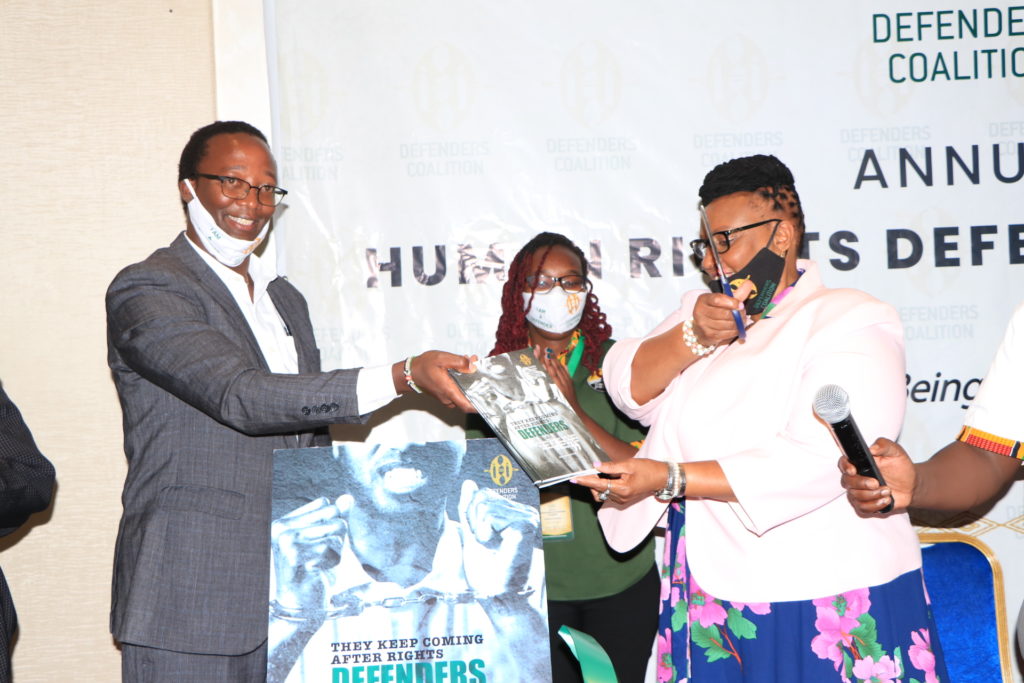
They Keep Coming After Rights Defenders
In 2016, the Defenders Coalition published the first edition of trends report and case digest on human rights defenders and the law in Kenya. The report documented trends of human rights violation against HRDs and highlighted landmark court decisions that have had an impact on the working environment of HRDs. This second publication updates the first edition of the trends report and case digest. It focuses on the major events and cases that were reported or decided during the period 2016 to 2019. Major events that impacted on the work of human rights defenders include the 2017 general elections and the terrorist attacks that occurred in Nairobi in January 2019.
The emerging trends of human rights violations that were documented during the reporting period include threats to personal safety and integrity of human rights defenders. This was epitomized by the brutal murder of lawyer Willie Kimani, his client and a taxi driver in June 2016 for pursuing justice against administration police officers who were harassing his clients. In April 2018, Evans Njoroge alias Kidero, a student activist, was shot and killed by a police officer for leading students in demonstration. In August 2018, land rights activist Esther Mwikali was killed and her body dumped in a thicket in Mithini. Robert Bundotich, a community leader from the Sengwer Community was shot dead by Kenya Forest Service officers in January 2018.
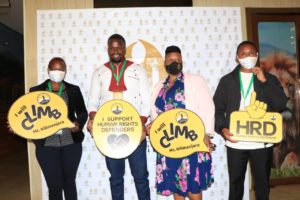
LGBTIQ rights activists have made modest progress but negative narratives against LGBTIQ community forces LGBTIQ rights HRDs to continue to operate in the shadows seriously harming the effectiveness of their advocacy efforts. During this period the LGBTIQ community went to court to challenge discriminatory laws and practices with mixed results. In the first case which was an appeal filed by the NGO Board challenging the decision of the High Court directing the Board to register an NGO that sought to advocate for the rights of LGBTIQ community, the NGO Board lost its case at the Court of Appeal. In the second case, several petitioners unsuccessfully challenged the constitutionality of sections 162, 163, and 165 of the Penal Code.
Further, the right to protest, freedom of assembly, freedom of association and freedom of expression faced severe restrictions particularly during the electioneering period. Human rights NGOs, human rights monitors, media houses, journalists and bloggers faced harassment at the hands of state regulatory agencies and policies for reporting or commenting on issues that were deemed unpleasant by the state. The war on terror THEY KEEP COMING AFTER RIGHTS DEFENDERS Case Digest on Human Rights Defenders and the Law in Kenya 9 did not spare human rights defenders either. At the community level, grassroots human rights defenders faced harassment at the hands of the police for fighting for their land rights or advocating against extrajudicial killings. On the legal front human rights defenders scored major victories in court. Criminal defamation laws in the penal code and section 29 of the Kenya Information and Communication Act were declared unconstitutional.
The report concludes with several recommendations that will improve environment in which human rights defenders in Kenya operate. It calls upon the government to enact a comprehensive legal and policy environment in line with the UN declaration on human right defenders that will secure the right to defend human rights in Kenya.
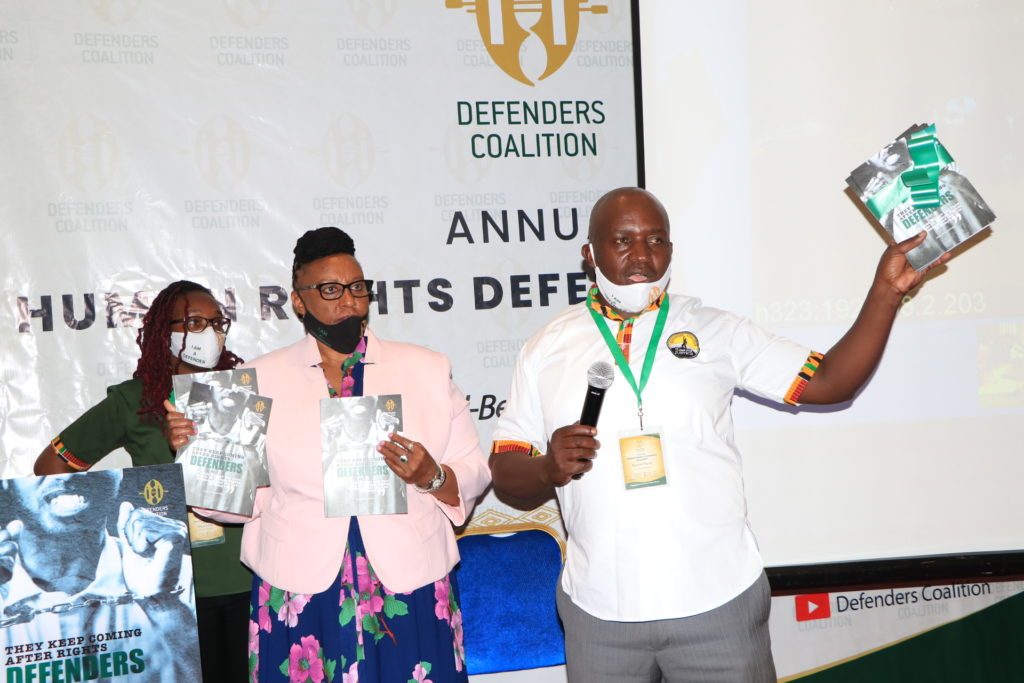
UN Human Rights Council – 45 th regular session
Item 6: Adoption of the report on the UPR of Kenya
Oral statement
Delivered by: Kamau Ngugi
Madam President,
The Defenders Coalition and DefendDefenders welcome the acceptance by the Government of Kenya of a large number of UPR recommendations. Kenya’s January 2020 review was a milestone for human rights advancement. It was also a consultative process with various stakeholders. We salute the fact that the Kenyan Government displayed political will to engage on human rights challenges, including past and ongoing violations. There have been notable instances where the human rights environment has improved since the second review. We warmly welcome Kenya’s engagement with civil society, at the national, regional,
and international levels.
We welcome Kenya’s acceptance of recommendations on:
(1) Ensuring proper, transparent, and effective investigations in cases where human rights defenders (HRDs) have been harmed, and specifically to adopt a law protecting HRDs in accordance with international standards. We recommend that Kenya implements this recommendation by domesticating the model HRD protection policy and making public pronouncements supporting the work of HRDs;
(2) Upholding the rights to freedom of expression and association, including of media organisations and HRDs, in accordance with Article 19 of the International Covenant on Civil and Political Rights (ICCPR) which Kenya is party to. We recommend that Kenya also considers the role of whistleblowers in promoting respect for human rights. We ask that the Government enacts the Whistleblowers Protection Bill 2018, reviews the Associations Bill 2018, and ensures that laws governing the operations of NGOs are in line with the right to free expression. We welcome the acceptance of recommendation 142.157;
(3) Creating a safe and enabling environment in which HRDs and civil society can operate free from hindrance and insecurity, including through the full operationalisation of the Public Benefit Organisation Act 2013. We welcome the acceptance of recommendations 142.45, 142.56, 142.162, and 142.164; and
(4) Revising and enacting the draft Data Protection Bill, particularly to create a data protection framework in line with international standards on the right to privacy. Whereas we welcome acceptance of this recommendation and note that the Act was enacted, the implementation of the guidelines is lengthy and there have been cases of privacy rights violations since January 2020, which need a recourse.
We regret that Kenya did not go a step further in its replies to ratify the Optional Protocol to the Convention Against Torture and other Cruel, Inhuman or Degrading Treatment or Punishment (OP-CAT). It is not too late, as the UPR is an ongoing process. We encourage the Government to reconsider its position on all “noted” recommendations.
Thank you.
Thursday, 27th August 2020
H.E. HON JOHN POMBE MAGUFULI
PRESIDENT OF THE UNITED REPUBLIC OF TANZANIA DAR ES SALAAM
TANZANIA
Dear Sir,
REFERENCE: OPEN LETTER
CONCERNS OVER SHRINKING CIVIC SPACE IN TANZANIA
Your Excellency, receive warm greetings from the rest of Africa. It is our hope that this letter finds you in the best of health and high spirits.
We, the people from Africa, comprising of community based organizations, women groups, religious and faith based institutions, human rights defenders, youth associations, grass root movements, unions of persons living with disabilities and civil society organisations, do hereby write to you respectfully, concerned and alarmed by the shrinking civic space in your country.
Over the last few months, we have noted the following which has led us to believe all is not well:
without government approval;
and journalists in the country; and
Your Excellency, as a result of the above, we are perturbed, as fellow Africans, by the deteriorating human rights situation in your country and infringement of civil liberties guaranteed by the Constitution of Tanzania. It is our view that Tanzanians are living in distress as a result of the on going drawbacks on their freedoms as citizens.
Further, we take cognizance of the fact that Tanzania is a signatory to all major international human rights instruments including the International Convention on Civil and Political Rights (ICCPR), Convention Against Torture (CAT) and African Commission on Human and Political
Rights (ACHPR) resolutions. However, we are saddened by the reneging of these international standards in the country.
Your Excellency, to this end, we call on you as the President to reverse the negative trends witnessed in the last few months in order to create a conducive environment by your government to take back Tanzania to the path of justice, rule of law and respect for human rights. We further call on you to direct the following:
affiliation as long as they respect international media standards
human rights defenders
Political Parties to support free, fair and credible elections
Rights Defenders Coalition so that they continue with their work to provide civic education and support safety and protection of human rights defenders in the country.
As fellow Africans, we are confident that the implementation of the above will go a long way in ensuring promotion of democracy, human rights, justice and rule of law in your country.
Your Excellency, it is our belief that the above warrant your immediate action and will subsequently restore faith in institutions of governance in Tanzania.
We look forward to your swift and speedy action. Sincerely,
Defenders Coalition partnered with the Social Justice Centres Working Group and the German Agency for International Cooperation (GIZ) in a project dubbed Paomoja Tuangamize Corona Campaign that was implemented throughout the month of July.
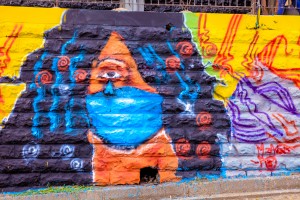
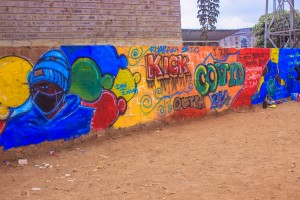
Figure 1.1 Grafitti and murals erected on strategic wall in different regions across communities to create awareness on Covid-19 to spark conversations on its awareness.
The campaign was launched on July 3 in Dandora Community justice Centre to address the novel Corona Virus Disease 2019 (COVID-19) pandemic which has severely disrupted lives and caused massive unprecedented destruction across the World, leaving great loss and grief in its trail. It is not clear how long this would last but economists project that its social and economic impact could last the rest of the year.
Focussing on a participatory approach towards the response on Covid-19, the campaign brought together the social justice movement and human rights defenders from the grassroots across the country to address the disproportionate economic disruptions, access to information, basic food stuffs, livelihoods and most importantly mainstream the human rights implications within communities.
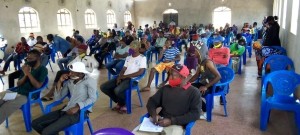 .
. 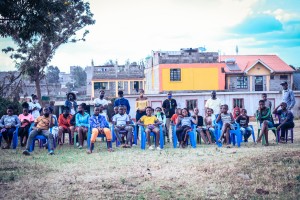
Figure 1.2: Forums conducted by justice centres movement to sensitize communities on wellness during
Covid-19 pandemic in Githurai and Dandora Justice Centres respectovely
Based on reports from monitors from across the country, it was evident that rights violations have increased in the grassroots but lacked a platform/goodwill to be addressed. Coronavirus disease has only made it worse. The campaign therefore, has been on the forefront condemning, creating awareness and calling to action of relevant stakeholders to embrace a human rights based approach while resounding to Covid-19.
The measures put in place by the government to curb the spread of covid-19 have had a diverse impact on the lives of Kenyans. Those at the bottom of the social classes have been the worst hit.
The virus has caused death, injuries and grief for communities, particularly those living in the informal settlements and vulnerable populations. Government efforts to contain the pandemic including encouraging citizens to stay at home, banning all public and social gatherings and the a nationwide curfew between 7pm to 5am (has since been altered) to be observed by all citizens except for select institutions and professions classified as essential service providers as well as restricted movement across cities with high prevalence of infection, namely Nairobi, Mombasa, Kwale and Kilifi have further disrupted the informal economy, destroying small businesses and rendering many community members destitute
The campaign had a reach to the following justice centre; Dandora Community, Mathare, Ruaraka, Korogoch Justice and Information Centre, Githurai, Ghetto Foundation, Kayole, Mukuru, and Kiamaiko Justice Centres through graffiti, alternative messaging and community radio conversations.
Others that ensured the success through a fast tracking implementation of the campaign are Kibera, Kiambiu, Alqamar S,Makadara Social Justice Centre, Kamkunji, Kamkunji Youth Empowerment Network, Kariobangi, Elengatawas, Kondele, Voi, Vihiga, sisters for Justice, Busia, Chemilil, Changamwe and Magharibi Social Justice Centres.
The campaign in itself was an intervention based on the government, through the Ministry of Health regularly provided information updates on the spread, those infected but also on measures to contain the spread of the virus but failed to incorporate community voices in the decision-making forums and therefore public policy was not informed by community input even when the communities had invaluable contributions to make and able representatives to articulate to enhance interventions through better community-government partnerships.
The project has since sought to bridge this gap.
Therefore, the project intervened through immediate responses that targeted at enhancing community awareness on the Covid-19 dangers with a particular focus on raising community responses to protect themselves against the dangers of the virus especially during the community transmission phase.
Secondly, the project sought to build community resilience over the tough months ahead as a cloud of uncertainty continues to hang over our heads.
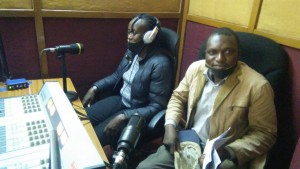
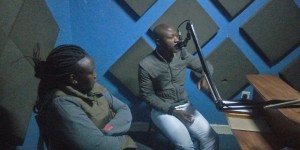
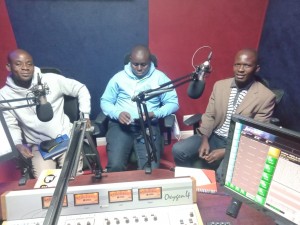
Figure1.3: HRDs attending community radio conversations in Vihiga FM- Vihiga, Pamoja Fm-Kibera and Radio Namlolwe- kisumu respectively
Appreciation statement for mass funds drive for bail processing during #SabasabaMarchForOurLives 2020
Defenders Coalition appreciates the hundreds of Kenyans and friends of Kenya who contributed to the mass funds drive- bail processing kitty for human rights defenders who were arrested during the #SabasabaMarchForOurLives march on 7 July 2020.


The arrested HRDs were commemorating what started 30 years ago, when gallant Kenyas brazed teargas, beatings, injuries, torture to say no to dictatorship by Marching to Kamukunji grounds to call for liberation. In 2020, human rights defenders from various justice centres across the country staged a commemorative event, to reflect on the dissident conduct of the government towards the adoption of one of the most progressive constitutions in the world.
However, Police Officers disrupted the peaceful processions by unleashing unbelievable violence and embarked on an arresting spree where 63 human rights defenders were arrested across Nairobi. The arrested were detained in four police stations as follows: Kilimani Police Station(18), Kayole Police Station(12), Central Police Station(25) and Muthaiga Police Station(8).
Amongst the many interventions that aimed at securing their release from unlawful police custody, Defenders Coalition embarked on a mass funds drive. The fundraising initiative raised Kshs. 770,494 (Seven hundred and seventy thousand, four hundred and ninety four shillings).
These funds have already been/will be used towards

Defenders Coalition is wishes to express its gratitude to Tunawiri- an organization that works to assist grass-root organizations in crowdfunding and who were instrumental in creating awareness online on the happenings during march.
To all comrades, Kenyans and friends of Kenya your thoughtful generosity is invaluable to us as your donation, solidarity and sacrifice will ensure the safety, security and wellbeing of those at the frontline championing our rights and freedoms.
Defenders Coalition